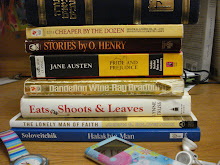I can take very little credit for the content of the following essay. I wrote it last year as part of the midterm of an excellent class entitled "Intellect and Emotion In Jewish Thought," taught by R' J. J. Schachter. All the sources mentioned were taught in class--the only original aspect of the essay is the ending, in which I discuss my personal 'religion in essence'--and even that idea was originated by an amazing friend, though I expanded on it and related it to the sources. Final disclaimer: I apologize for the fact that it isn't all that well-written--given that I wrote it under a time pressure during the midterm, it isn't as lucid as I would otherwise have liked it to be. Nevertheless, I think it presents some interesting and relevant ideas for the chag, so I hope you are able to glean something from it.
Rosh Hashana presents an interesting dilemma. The gemara (Archin 10b) explains why we don’t say hallel on Rosh Hashana: how could we sing shira when the books of life and death are open before Hashem? This indicates an important component of fear on Rosh Hashana. Yet the gemara Yerushalmi explains that we are different than other nations because instead of wearing black at the time of judgment, we wear white and eat and drink and rejoice, confident that Hashem will judge us kindly. These two sentiments seem contradictory.
From the perspective of religion in manifestation (halakhic practice), a choice between the two must be made: may we fast on Rosh Hashanah or not? Do we say ‘vehasianu’ in tefillah or not? Does an avel mourn or not? However, from the perspective of religion in essence (religious thought/emotion), it is not necessary to choose one or the other—rather, we can have a synthesis of both.
The Rambam in Hilchos Chanukah writes that we don’t say hallel because there is no simcha yeteirah on Rosh Hashana. Yet the word “yeteirah” indicates that there is an aspect of simcha in addition to the yirah of Rosh Hashana. The Sefer Hachinuch writes that Rosh Hashana is a gift, a day on which we can achieve forgiveness, and so we should be happy. Yet, it is also appropriate to have extra yirah because of the day’s serious nature.
So the question is: how do we balance these two seemingly contradictory emotions? The Taz offers one solution: our anxiety motivates introspection, which motivates teshuva, which motivates a confidence that we will be judged favorably. However, to me this solution doesn’t seem satisfactory, because according to this opinion the anxiety comes before the confidence, and then as a result of preparation the anxiety is dispelled. So it would seem that by the time Rosh Hashana itself arrives only confidence is present, since the appropriate preparation has occurred.
Instead, I seek a way to merge the two emotions at once. My personal religion in essence relates to the opinions of R’ Neventzal and Rabbeinu Yonah. R’ Neventzal says that on an individual level we are nervous about being judged, but on a communal level we are confident that Hashem will be merciful. Rabbeinu Yonah explains the phrase in Tehillim (
My personal religion in essence on Rosh Hashana is similar to this idea. Yes, I am afraid of being judged, in awe of God’s greatness—yet, I am joyful in the mere knowledge that God exists, that there is someone to judge. Imagine life in a world without God, without a Creator who cares enough about His children to judge them. It would be a horrible existence, isolated and purposeless. The fact that I am being judged makes me joyful at the same time that it makes me fearful. Like Rav Neventzal explains, on an individual level I am afraid of the judgment that I may receive, but in a greater sense I am confident in the knowledge that there is a Creator who takes care of the world. Like Rabbeinu Yonah, I tremble in awe and fear of God, yet rejoice in the fact that He exists and desires a relationship with me. The two emotions are not contradictory at all, but rather go hand in hand. I fear because I am being judged, but I also rejoice because I am being judged.

